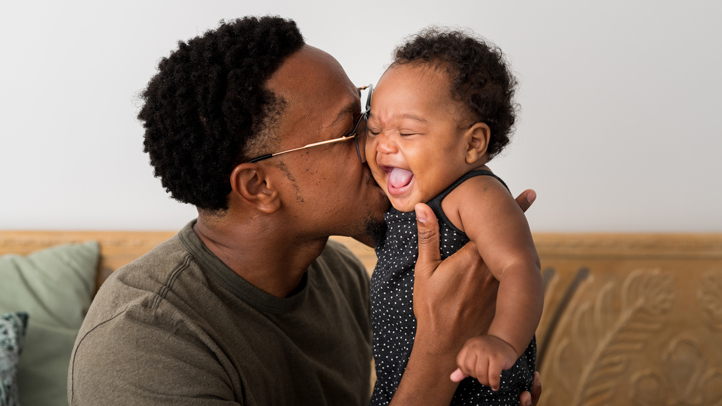It's one of the great parenting moments you've been waiting for — when your baby starts laughing. And once you hear your little one’s laugh for the first time, you won't be able to get enough of the sound, whether it's a chortle, chuckle or full-belly giggle.
Your baby has been experimenting with sounds from her first month, cooing, gurgling and making throaty sighs.[1] Laughter is the next (hilarious) step in learning to communicate.
When do babies laugh?
Many babies start to chuckle for the first time around the 4-month mark, according to the Centers for Disease Control and Prevention (CDC), although others might take a little longer.[2] Your baby will likely share her true laugh with you by the time she’s 6 months old.[3]
Your baby's first laugh might be inspired by something as simple as seeing a favorite toy, pet or person (that would be you!). While these early laughs and giggles are delightful to hear, they're also rewarding for your baby — she loves hearing her own voice and seeing how you react to the sounds she makes.
Once she's discovered how to laugh out loud, your baby may giggle "just because" — laughing feels good, after all, and it's such a fun new sound to make.
Plus, with each coo and goo she's learning and practicing how to move her mouth and tongue to produce different sound effects.
How to make your baby laugh
Before you launch your stand-up routine, make sure your sweetie is prepared to be a good audience. Babies who are fed, rested and alert are most likely to be ready for comedy hour.
While baby may not have your sense of humor just yet, she does pick up on your comical cues. When your sweetie sees you smiling and laughing, she’s more likely to reciprocate.[4]
Read This Next
“Parents often ask how they can get their baby talking and laughing,” says Kyle Monk, M.D., a board-certified pediatrician at Cedars-Sinai Medical Center in Los Angeles, California and member of the What to Expect Medical Review Board. “It is so important to engage your baby throughout the day.”
Have fun discovering what makes your little one light up with laughter. Experiment with a variety of different techniques to encourage your baby to laugh, like:
- Making funny faces
- Dancing around with goofy moves
- Making silly sounds
- Singing songs
- Blowing raspberries on baby’s belly
- Gently bouncing baby on your knee
- Imitating the funny sounds your baby makes, like “gah”
- Gently clapping baby’s hands and feet together
- Playing games like patty-cake and peek-a-boo
Continue to encourage giggles and coos by talking with your baby often. Provide a stream of commentary as you go about your day: "Here's a clean diaper so you'll feel nice and dry. All done! Now I'm snapping your shirt — one, two, three snaps!"[5]
It may feel silly to chatter away to someone whose conversational skills are limited to a few vowel sounds and gurgles, but this is how your baby begins to learn language and laughter. And by pausing in your patter, you not only give her a chance to chime in and test her own voice, you're also demonstrating how conversation works.[6]
When you do hear your baby laughing, try to look excited to encourage them to keep doing it, Dr. Monk says. “Let them see you smile and happy, so they in turn try to match your emotions.”
Your baby may start to chuckle when she’s about 4 months old, though her true laugh might take a little longer, possibly closer to the 6-month mark. You might notice that your baby seems to laugh or smile in her sleep. These are involuntary movements that can happen during her active sleep cycle. Engaging with your baby throughout the day can help prompt her laughter. Try making funny faces, silly sounds or singing songs to start. Some babies take longer to laugh, and that’s OK too. Talk to your pediatrician if your little one has shown no signs of laughing by 6 months.
Why do babies laugh in their sleep?
It’s common for babies to smile or twitch while they sleep. And while no one knows for sure what your little one is dreaming about, she’s probably not remembering one of your silly faces — as nice as that would be.
More likely, your baby is entering what’s called an active sleep cycle. During this stage of sleep, babies can make involuntary movements, including smiles or chuckles.[7]
Why might your baby not laugh yet?
Don't be surprised if your little one remains straight-faced at first — newborns can be a tough crowd, especially close to feedings or bedtime. Some of your early efforts to make your baby laugh may produce more tears than chuckles if the timing's not right or she feels overwhelmed.
Remember: That first laugh is just one part of your baby's ongoing exploration of sound and vocalization.
If your 3-month-old makes a lot of joyful noise — squealing, chirping, cooing, gurgling — without necessarily laughing, there's no need for concern (even though you might be understandably impatient to hear her first true giggle). But if your baby is showing no signs of laughing by 6 months, bring it up with your pediatrician.
Some babies are serious right from the start — and are no less charming for it. Just as some adults are quicker to laugh than others, some babies are as well. Over time, you'll learn how to spark smiles, giggles and chuckles in your little one.
Laughing is an early step to socialization and communication. And with a little time (and plenty of stimulation!), your baby will be waving and pointing, babbling and playing peekaboo before you know it.














































 Trending On What to Expect
Trending On What to Expect





